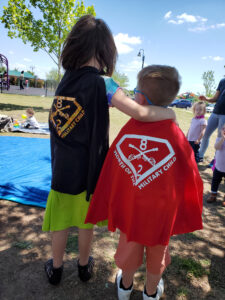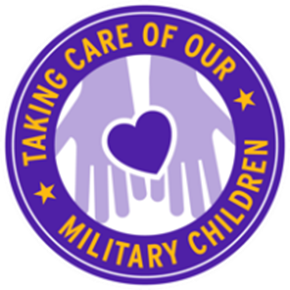History of Month of the Military Child
Former United States Secretary of Defense Caspar Weinberger established the Month of the Military Child in 1986. In America, the month of April recognizes the many sacrifices made and challenges faced by children who are part of a family where at least one parent is a military member.
Many military communities and local organizations nationwide hold special events in April to celebrate military families and children. Some of the organizations I have been involved in have held park play dates with games and treats for the children, presented special concerts and performances, and provided free tickets to other special events in the area. During the COVID-19 quarantine, when in-person events were put on hold, one unit sent postcards and candy to the children in our battalion.
Where are you from? This question is a fairly common one heard when you are meeting new people. Most children would name the place they currently live or where they were born. But what if you have moved six times before age 18, living in multiple states and countries? Maybe you name the last place you lived, even though you were only there for six months. Perhaps you say where you were born, even when everyone in your family was born in a different location. Answering this question becomes a very common dilemma for a military child.
My children are currently ages 14, 17, and 19. For context, they have:
- Moved six times in 17 years
- Lived in five states and two countries
- Attended three preschools, five elementary schools, three middle schools, and two high schools
- Had seven bedrooms/houses/neighborhoods/friend groups
- Been involved in six different Boy Scout troops
I recently polled a few military children (or #MilKids) I know for insights into military life.
The best thing about being a military child:
- “The people you meet and the experiences.” – boy, age 19
- “Meeting new people from all over the world.” – girl, age 14
- “Meeting new people.” – boy, age 11
- “Lunch Bunch with the military kids in school, and going to see what dad does at work.” – girl, age 8
- “Getting to live in new places and escape your enemies.” – child, age 11
- “Going to the PX!” – girl, age 15
The worst thing about being a military child:
- “Moving and uprooting every couple of years.” – boy, age 19
- “When my dad was deployed; being separated from him.” – girl, age 14
- “Moving away from my friends.” – boy, age 11
- “I hate leaving my friends.” – child, age 11
- “Moving.” – girl, age 15
Military children often have one or both parents missing at pivotal life events: their first day of school and graduation; when learning how to ride a bike; at sporting events, school programs, and awards ceremonies; for birthdays and holidays; and so many other countless “first” life events. Even in the face of so many things that could affect them negatively, children of military parents adapt and excel. Their life experiences have made them strong, empathetic, intelligent, independent, friendly, caring, and courageous.

Some of my personal superheroes!
Not everyone gets to see Santa arrive on a tank - #Milkids have all the fun!


Lots of organizations support our #Milkids when their parent deploys. Here are two of my "Army Brats" handing out teddy bears to some of the younger kids in our unit.
Children born to military parents are not exempt from medical issues. Just like their non-military counterparts, military children catch colds, have chronic diseases, and are diagnosed with genetic and other rare diseases. Accessibility to certain healthcare programs is often dictated by which branch of the military the parent is in.
My experience with the military healthcare system is strictly with the US Army. In some ways, the Army can be extremely helpful in medical situations:
- Reimbursements are paid when someone needs to travel for a specialist visit
- The Exceptional Family Member Program (EFMP) prevents family members with special needs from being sent to locations without adequate medical or educational services
- Enrollment in EFMP also allows a soldier to be stationed in specific locations local to required specialty care for themselves or their family members
Emergency, surgical, and therapy costs (in-network) are entirely covered by military insurance. One Army family I know personally uses many EFMP-qualifying services to care for their child diagnosed with the genetic rare brain disease lissencephaly. By enrolling in EFMP, the soldier has been able to stay stationed in the same place to keep his daughter with specialists and therapies that have improved her quality of life.
Her mother says, “One good thing about being in the military is they provide the respite care required for my daughter, so we don’t have to pay more for a babysitter qualified to watch her. A bad thing about being in the military is that with my daughter having a shorter life expectancy, we feel like she is missing out on spending time with grandparents, aunts, and uncles since travel with her is harder.”
I recently reached out to a friend to ask her to share her experience as a military wife and mother of two children diagnosed with rare genetic disorders:
“My husband has been an Army officer for almost six years. I am the mother of three little girls, ages 3, 2, and 7 months. My oldest and youngest daughters have rare genetic diseases requiring us to spend almost every weekday at therapies, specialty clinics, and hospitals.
In the past two years, we have lived in five locations: one home in Texas, an extended hotel stay in Texas while waiting to be sent to our new duty station, two houses in Georgia, and an extended stay in South Dakota. We are currently about to move to our new duty station in Tennessee.
One of the benefits of being a military child is that most of our financial and medical needs are met. While many civilian families would be paying thousands out of pocket for co-pays, medicines, and specialty food supplies- that is not a burden we carry.
A challenge we face is the difficulty associated with continuity of care. Every time we leave an area, we must reestablish care with new doctors and therapists. Since we have children with multiple, complex, and extremely rare diseases, it is hard to find doctors who even know how to treat our kids. All three of my children have to sit for hours in waiting rooms as we go from one doctor visit to the next, reestablishing care. Being able to stay in one location would drastically reduce the number of these appointments. Why do I bring all of the children to every medical visit? Because it is nearly impossible to find reliable, medically capable caregivers when we are constantly moving.
A final thought: military children are resilient. Whether sitting in a waiting room instead of playing at a park or sleeping on a mattress on the floor while waiting to have their beds delivered by the moving company, our kids seem happy, stable, and content, no matter where life takes us.”
Clincierge is extremely proud to work with the Hiring Our Heroes (HOH) organization. Founded in 2011, HOH connects United States military service personnel, veterans, spouses, and caregivers to employers nationwide. Hiring Our Heroes participants complete a six-week or 12-week fellowship program with the potential for full-time employment with Clincierge following completion of their fellowship.
As discussed earlier, military families must often move across the country, or even across the world, with very short notice. Many of these positions last only a few years, so families are repeatedly forced to start over in new places. Clincierge’s remote-first policy allows our employees the flexibility to work from home no matter where they are currently stationed or where they will be relocated next. Our entire business model revolves around the logistics involved in getting clinical trial patients to their site visits, so we truly understand the many needs of our employees as they traverse life in the military. A sense of continuity is imperative for both our study participants as well as our military families, and we work diligently each day to provide this stability for all.
Learn more about our work with the Hiring Our Heroes program and our fabulous fellows in our recent blog.
Purple Up!
The color purple was chosen as the representative color for the joint environment of all service branches. Individuals are encouraged to wear purple as it combines the colors of the four branches of the US military:
- Army – green
- Airforce/Navy/Coast Guard – blue
- Marines – red
#MOMC2023 #PurpleUp2023



